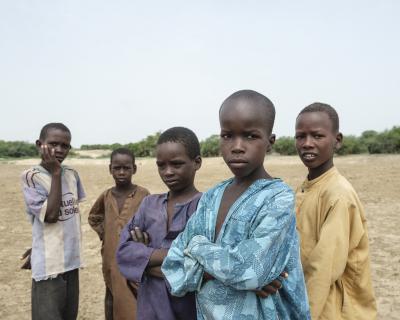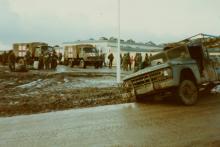Case prepared by Daniel Miller, Krishna Shah and Ian Davis, J.D. students at Emory University School of Law, under the supervision of Professor Laurie Blank, Emory University School of Law, together with Tsippora Lesser, Tsipi Zipper and Daniella Perlovsky, IDC ICHL Clinic Students, with the support of Feigue Barbaron and Ran Yosef, Project Coordinators, under the supervision of Adv. Yael Vias Gvirsman.
A. AN ACTION PLAN ADDRESSING THE USE OF CHILD SOLDIERS
A senior United Nations official today hailed the action plan signed by the Government of Chad to end the use of children by the country’s security forces, while highlighting important next steps on the path to eradicating the scourge of child soldiers.
“The signature of the action plan reflects the political will and commitment of the Chadian Government to move forward in ending a key grave violation against children. While this is an achievement in itself, the bulk of the work lies ahead,” Radhika Coomaraswamy said at the signing ceremony in the capital, N’djamena.
Chad is one of only six governments listed by the Secretary-General for violations against children in conflict. The action plan signed today between the UN and the Chadian Government aims to ensure the release of all children associated with the Chadian National Army (ANT) and associated security forces.
Ms. Coomaraswamy, the Secretary-General’s Special Representative for Children and Armed Conflict, said the action plan is an expression of the Government’s “steadfast commitment” to building a protective environment for children in Chad.
It builds on the N’djamena Declaration of last year, in which Chad, along with five other States, pledged to take concrete measures to halt the recruitment and use of children by security forces and armed groups.
She noted that, once completed, the action plan will end a grave violation against children and have a direct impact on the lives of former child soldiers who will return home to their families.
“But it will also have wider repercussions for Chad, both domestically and internationally,” Ms. Coomaraswamy added. “Domestically, removing children from its fighting force will contribute to the professionalization of the armed forces.
“On the international stage, a complete and durable halt in the recruitment and use of children by the Chadian national army, including newly integrated elements, will trigger the removal of the Chadian Government from the Secretary-General’s ‘list of shame,’ annexed to his annual report on children and armed conflict.”
[…]
B. CHAD’S COMMITMENT TO ENFORCETHE ACTION PLAN
[
Source: Chad Signs an Action Plan to End Recruitment and Use of Children in its National Army and Security Forces, UN Office of the Special Representative of the Secretary-General for Children and Armed Conflict, 16 June 2011, available at
https://childrenandarmedconflict.un.org/16jun11/]
[…] The Special Representative of the Secretary-General for Children and Armed Conflict, Radhika Coomaraswamy, traveled to Chad this week to witness the signing of an agreement between the Chadian Government and the United Nations to end recruitment and use of child soldiers. The action plan spells out concrete steps, which when taken, will result in Chad being removed from the Secretary-General’s list of parties who recruit and use children.
The Chadian Government has committed to:
• Step-up efforts to ensure that the Chadian National Forces (ANT) and recently integrated armed groups are child-free;
• Enable verification of military installations by the United Nations to monitor compliance with the action plan;
• Align national legislation with its international obligations for children;
• Take punitive measures against those who continue to violate the agreement;
• And to put in place other preventive measures.
“I commend the Chadian Government for signing this action plan, which demonstrates political will for the protection of children. I encourage them to maintain this determination as they move forward to implement the plan. Real change will also require long-term reintegration and access to education for all girls and boys,” said SRSG [Special Representative of the Secretary-General] Coomaraswamy.
[…] In a meeting with SRSG Coomaraswamy, President Idriss Déby Itno affirmed his personal commitment to implement the action plan.
SRSG Coomaraswamy was struck by the marked improvement in the security situation as compared to her last visit 2008. “Chad should now invest in the education of its children. Education, including vocational training, is key for the stability of the country.”
[…]
C. PRESIDENTIAL DIRECTIVE TO PREVENT THE USE OF CHILD SOLDIERS
1. PREAMBLE
[…]
[T]he Government of the Republic of Chad adhered to the principles of the [2000] Optional Protocol to the Convention on the Rights of the Child [on the involvement of children in armed conflict], as well as to the [2007] Paris Principles and Commitments.
[…]
In order to guarantee respect for its commitments and to create definitively an environment that saves children from recruitments and any form of use by the armed and security forces of Chad, the present directive provides clear and precise guidelines and instructions to be respected without fault, subject to sanctions stipulated in the laws and regulations governing the armed and security forces of Chad and those relating to child protection.
2. PURPOSE AND SCOPE OF APPLICATION
The purpose of the directive is to prevent and put an end to the recruitment of children by armed forces and armed groups. It applies to the armed and security forces and the associated major formations. […]
3. DEFINITIONS
[…]
3.4 Conditions for Recruitment
Law No. 011/PR/2006 amending the Ordinance No. 06/PR/92 of 28 April 1992 on the Status of Military Personnel in its article 44 stipulates that the recruitment of soldiers, cadets in the gendarmerie and guards is done by means of conscription, an exam or direct enlistment subject to the following conditions:
[…]
- Be over 18 years of age;
[…]
4. RESPECT OF THE CONDITIONS FOR RECRUITMENT
4.1. Provisions on verification of the recruitment age
Recruitment into the Chadian National Army is done in accordance with the Ordinance No. 006/PR/1992 and the laws No. 11 and 12/PR/2006. For strict respect of these fundamental documents of the Chadian National Army, the following implementing measures will henceforth be in place:
4.1.1 The personnel responsible for the recruitment will beforehand receive training about the rights and protection of children in armed conflicts;
4.1.2 All the personnel responsible for the recruitment will have at their disposal a copy of the Recruitment Procedure Handbook drafted for this purpose;
4.1.3 The recruitment team will proceed with recruitment on the basis of a birth certificate, which is the only valid document for age verification and confirmation. Candidates that do not have such a certificate will be recruited only after a systematic verification of their age through a medical examination, physical check and a personal interview, in case of serious doubt about their age[.]
4.2 Sanctions
4.2.1. With regard to the government’s commitments, I ask you to instruct all members of the armed forces and security forces that any person found guilty of recruitment and use of children in Chad’s armed or security forces will face severe disciplinary and penal sanctions.
[…]
D. THE MEASURES TAKEN BY CHAD
[…]
Just after the 31 October 2013 deadline – and as more Chadian troops were deployed to neighbouring Central African Republic (CAR) – Child Soldiers International conducted a mission to N’Djamena. The team met with government and UN officials responsible for the implementation of the Action Plan to measure tangible and durable change in legal and practical protection of children against recruitment and use, and to identify remaining challenges. Since then, Child Soldiers International has also kept abreast of further implementation and follow-up measures taken by the government and found that major steps forward since May 2013 are as follows:
• Child recruitment and use were criminalised through the adoption of a Presidential Decree (Ordonnance présidentielle) on 4 February 2014.
• A Presidential Directive was adopted in October 2013 to confirm 18 as the minimum age for recruitment into the armed and security forces, establish age verification procedures, and instruct that “penal and disciplinary sanctions” will be taken against those breaching the orders. The directive was disseminated among commanders of all eight defence and security zones of the country.
• The government and the UN jointly conducted large-scale screening exercises in each of the eight defence and security zones in August-October 2013. Military commanders cooperated in the reviewing of nearly 4,000 members of the armed and security forces.
[…]
• Child protection units were created in each defence and security zone; they are composed of military and civilian staff and tasked with monitoring and protecting children‟s rights, as well as conducting training and awareness-raising activities in their zone. A central unit was also established at the Ministry of Defence in N’Djamena.
• A training of trainers on child protection was given to 40 army and security personnel in June 2013. The trainers then disseminated the training to 266 recruits in all eight defence and security zones throughout August-September 2013.
[...]
Nearly 4,000 troops were thus screened all over the territory and in a period of two months; none of them were certified as minors.
[…]
[…]
While the Government stopped recruiting children as soldiers into the national army in 2010, between February and August 2013, the Government and UN conducted joint inspections of all military districts in Chad to ensure compliance. No child soldiers were identified in the joint inspections. In April 2013, Chadian military officials identified and removed 14 children among rebel leader Baba Lade’s returning troops and transferred them to the Ministry of Public Health, Social Affairs, and National Solidarity (MSA) for reinsertion with their families. […] During the reporting period, the Government established Child Protection Units in all of Chad’s military zones. The Government also provided child protection training to 300 military personnel in Chad, as well as to 864 Chadian soldiers preparing for a peacekeeping mission abroad. In addition, MSA staff received training on child protection from the International Bureau for Children Rights and UNICEF. […]
In 2013, the Government established the new Inter-Ministerial Committee on Trafficking in Persons and Child Protection (ICTPCP) to replace the National Committee for Child Protection. During the reporting period, UNICEF conducted training with the Inter-Ministerial Committee on Child Soldiers to develop an age verification procedure allowing the identification of children among potential military recruits. […]
[Source: Child Soldiers International, Efforts to Put a Definitive End to Child Recruitment in Chad Should Continue, 1 July 2014, available at: Link not available.]
[…]
An awareness-raising booklet, in French and Chadian Arabic, to support and amplify the government’s prevention efforts […] was presented and distributed to members of the armed and security forces during a workshop in N’Djamena on 21-22 May 2014. Also attending the workshop were representatives of the Ministry of Defence, Ministry of Social Affairs and Ministry of Justice and Human Rights, as well as UN agencies, Chadian human rights organisations and international NGOs. Participants learned about the legal framework intended to protect children from recruitment in Chad, and all together they planned a series of awareness-raising, training and advocacy activities designed to involve all levels of society in prevention.
[…]
E. CHAD DE-LISTED FROM THE UN SECRETARY-GENERAL’S REPORT ON CHILDREN AND ARMED FORCES
[…]
“We have documented the cases of children recruited and used by 7 national armies and 50 armed groups fighting wars […].” said Leila Zerrougui, UN Special Representative on Children and Armed Conflict. “But there is also progress to report. No violations were recorded in Chad in 2013 and the country’s National Army has fulfilled all the requirements of its action plan. They are no longer on the list for recruitment and use of children.” […]
“Chad’s national forces have implemented all the measures included in the Action Plan signed with the UN and are no longer listed.”
[…]
Discussion
I. Classification of the Situation and Applicable Law
1. Was Chad party to an armed conflict between 2011 and 2014?
2. Does the existence of an armed conflict matter to determine whether IHL was respected in this case? Why is it important that some measures prescribed by IHL be integrated into national legislations irrespective of the existence of an armed conflict?
II. Protection of Children in Armed Conflict
4. Are the rules protecting children different in IAC and NIAC? Are States and non-State parties similarly bound by the provisions on the prohibition of recruitment and use of children in hotilities? (
P I, Art. 77 ;
P II, Art. 4(3) ,
6(4);
CIHL, Rules 135-
137)
III. Elements Contributing to Respect for IHL
7. (Document A) Apart from clear humanitarian considerations, do you think that domestic and international pressure may have played a role in Chad’s decision to commit to address the use of child soldiers?
8. (Document A) Do you see the link between the removal of children from the fighting force and professionalization of the armed forces, as pointed out by the Special Representative Coomaraswamy? Could you explain?
9. In your opinion, can signing of the Action Plan between a State and an international organisation such as the United Nations contribute to respect for IHL? Why/how?
10. What are the benefits of enshrining the IHL prohibition on the use of child soldiers into domestic law? Can such measures have a deterent effect? Is this an effective means of ensuring compliance with IHL by individual members of the armed forces or other armed formations?
11. (Documents A and E) In your opinion, can de-listing a State that stops using child soldiers from a ‘list of shame’ provide an effective incentive to respect IHL? Why?





